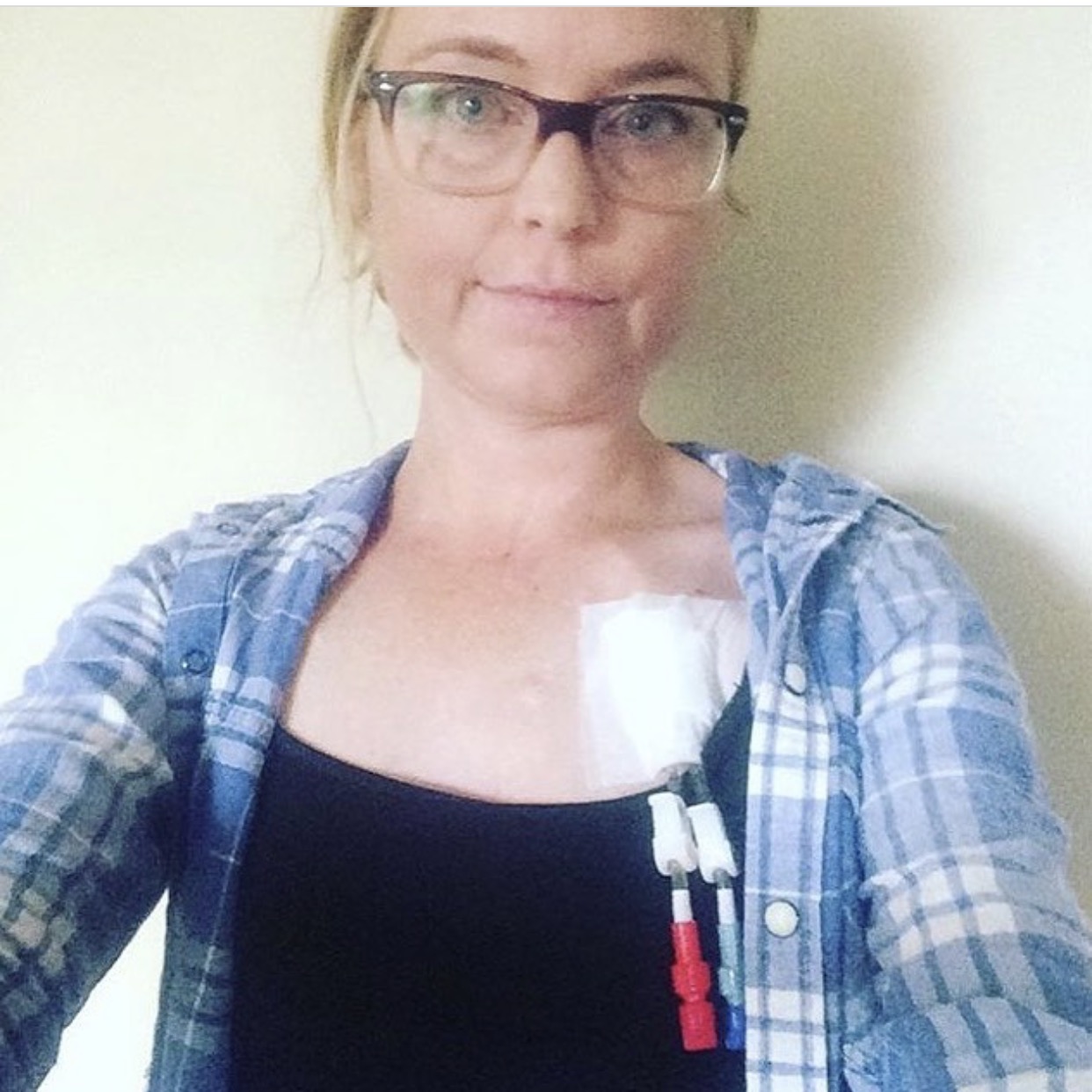Life Post Kidney Transplant
These two photos pretty much sum up my view about life while on dialysis compared to post transplant.
I was a different person on dialysis. I felt strongly about the fact that my freedom and overall life was being stripped away from me. I no longer had my classroom teaching career and I could barely maintain regular tutoring hours for income. I lost a tremendous amount of weight from my already small frame because of the restricting renal diet and the process of dialysis. I was extremely depressed as I isolated myself from friends and social situations for fear of getting hurt. The relationships in my life were hanging on by a thread, I had no sense of identity or future and was basically in survival mode day in and day out.
Now that I am over 1.5 years post kidney transplant I can say that life is VERY different. Most of it amazing, but it's important for outsiders to understand that there are still struggles post transplant. It's not a magical cure from kidney disease or a full reset button to your life and freedom from aches, pains and struggles. A huge amount of responsibility comes with getting a kidney transplant in my opinion. You and your new kidney become your number one priority. Yes you have more freedom in what you do, where you can go and what you eat, but that doesn't mean you can lose sight of what is important - maintaining your health and following doctor's instructions for care.
This blog is reflective of my own experience and journey through my 2nd kidney transplant. I in no way mean to generalize post transplant life. It's important to remember that every person is different as if their path post transplant.
Your Kidney is #1
Making it past the 1 year mark with my new kidney has been amazing. I have made many positive changes in my life from stress maintenance, a healthier diet, exercising regularly to educating myself as much as possible about how I can take the best care of my kidney and overall health. Regardless of your job, family and social needs you must remember the importance of this gift. A kidney transplant is not forever and in my opinion it must be emphasized that it is in fact an amazing gift of life and must be treated as such. It is when you forget the importance of this, that you can get into trouble with your health and the life span of your kidney transplant could be at stake.
Medications
After a kidney transplant your medications become a huge part of your life. They are literally what keep your body from rejecting the new kidney transplant and keep your levels balanced. I know some people have worries about the pressures of taking medications and may have fear of the responsibility that comes with it. In my opinion, taking medication every day is an easy trade off to dialysis treatments. The important thing is just to remember what each role the medications have in your health, maintain perspective and be grateful. A downside having to relying on medications is of course cost, but hopefully you have a good insurance plan in place to help. If not make sure you look into financial support such as American Kidney Fund. Another downside can be the side effects of medications, but have perspective with this too. Your doctor has prescribed you medication because the benefits outweigh the side effects. Just remember to be vocal about your medications, any side effects you are experiencing and ASK QUESTIONS regarding changes. Do not take it upon yourself to adjust dosage on your own.
Doctors
It is so important to have a Nephrologist and team of doctors that understand your medical history and that you respect. I've had so many doctors over the years and every single one of them tell me I am a complicated case. It's the ones that stick around and are up to the challenge and prove themselves to me that I can trust. Don't settle for a doctor that doesn't treat you with importance. I know health insurance can make this limiting, but know your options and speak up about your needs as a patient. Always get a second opinion too! Right now I see my local Nephrologist once a month and I'll go in more frequently if something isn't right. With UCLA, where I got my transplant, in the beginning I had to go several times a week, then every other week, then once a month to every 3 months and now I'm at once a year. It is so important to keep up with your doctor visits. Even if you feel fine, your blood-work might show something different.
Weight
My fluctuation in weight has been one of the most challenging changes I've gone through post kidney transplant. Starting dialysis when I was 11 did a number on my growth and I'm very aware of my size and yes it is an insecurity of mine. Being on dialysis also affected my muscle development and ability to maintain good weight. After I got my second kidney transplant in 2016 I was finally able to put on weight and this of course was in part because I could eat more foods without the restrictions of a renal diet, but I think also the medications affect how our bodies process things. I slowly put on 20, then 25 and today over 1.5 years post transplant I'm 28 pounds heavier than I was while on dialysis. This has been a real struggle for me because of the quick transformation of my body and me having to adjust to this new me. Ultimately I don't let it get me too down because I am so grateful for my new kidney, but when it does affect me I just use it as motivation to get out and be active regularly. It's so important to maintain a positive body image and outlook on life post transplant. Each day be grateful for all the positives in your life, no matter how small they may seem.
Diet
Even though I now have a properly functioning kidney and I don't need to be on a renal diet anymore, healthy food is a priority for me. It helps me manage my weight and it also keeps my blood pressure in check - I do still have a little elevated blood pressure post transplant. Above all, the body functions better with fruits and vegetables and good quality low salt food. I definitely recommend maintaining a healthy diet to ensure that your kidney will function as long as possible and your body is happy. You should have a positive relationship with food. You'd be amazed at how much salt is in fast food and and of course you can't control salt on food prepared from a chef in a restaurant. If you're not already into cooking at home, I recommend starting simply and trying some healthy recipes at home. You don't need to invest in cookbooks these days because of the amazing resources online. Just be careful where sugars and salt like to hide in different foods and whenever possible choose fresh options rather than canned and boxed processed items.
Exercise
I've always tried to maintain an active lifestyle. Nothing crazy, but I've been focused on yoga, bike riding, walking, jogging and gyms at different points in my life. On dialysis though, it was really difficult for me to be active because of the lack of energy. When I was preparing for getting listed for my second transplant though I used every non dialysis day as an opportunity to be active and maintain a healthy body so whenever my transplant date did come, I was ready and felt strong. Today I am SO grateful for my energy to get out and exercise. I'm certainly not able to jog for more than 2 minutes, but I am always setting new goals for myself to get stronger. I try to be active for 30-60 minutes 4-7 days a week. I highly recommend even walking every day to get your heart rate up a bit with minimal stress on your body. Talk to your doctor about what might be appropriate for you. Get social with it and invite friends or family to walk with you. Exercise shouldn't be the thing you HAVE to do each day, but rather the thing you GET TO DO every day. Any movement is good movement. Exercise is so important post transplant because it helps maintain a healthy heart and controls blood pressure.
For some positive reinforcement on staying active, we try to post things on social media but also check out Jenny Schatzle and The Jenny Schatzle Program on Instagram.
Promoting physical activity no matter the stage in the process, or whether you are a kidney patient or donor is a huge mission for Get Loud For Kidneys. Tag @getloudforkidneys in your social media posts of you being active and we will share to help encourage and inspire others.
Anxiety and Depression
It is really important for patients and caregivers to understand that receiving a kidney transplant doesn't magically make you feel 100% or "cure" you from struggles you had prior to surgery. Living with a chronic illness and going through a major surgery such as a kidney transplant can do a number on one's psyche. I started to have major anxiety and a few panic attacks before I started back on dialysis and I still have them occasionally post transplant. My doctor reminds me that we can be hypersensitive to anything our body feels because of all we've been through - and I've been through a lot with my health. We are on high alert for fear of something going wrong, losing our transplant and being back on dialysis. For this reason I remain on a low dose anti-anxiety medicine prescribed by my doctor, but also exercise and practice calming exercises such a focused breathing which has helped me. Of course don't be afraid to go to the emergency room if you feel something is truly wrong. Sometimes we just need to hear from a doctor that everything is OK. Try to fit some mindful calming exercises into your routine in the morning and evening eveneing. And also don't forget to give yourself a break. Yes you are a warrior, but you are still human and you've been through a lot.





